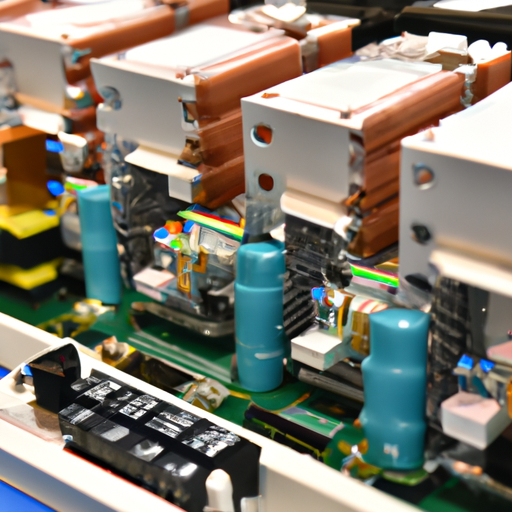Application Development in Isolation Transformers and Autotransformers: CFR-25JB-52-1M5
The development and application of isolation transformers and autotransformers, particularly models like the CFR-25JB-52-1M5, are pivotal in various sectors due to their unique functionalities and advantages. Below is a detailed exploration of their key technologies, applications, and notable success stories.
Key Technologies
| 1. Isolation Transformers | |
| 2. Autotransformers | |
| 3. Step-Up and Step-Down Transformers | |
Applications

1. Industrial Automation: Isolation transformers are integral in protecting sensitive machinery from voltage spikes, ensuring reliable operation in automated environments.
2. Renewable Energy Systems: Autotransformers are widely used in solar and wind energy systems to efficiently manage voltage levels, facilitating the integration of renewable sources into the electrical grid.
3. Telecommunications: Isolation transformers safeguard telecom equipment from electrical surges, ensuring signal integrity and reducing downtime.
4. Medical Equipment: In healthcare settings, isolation transformers protect patients and sensitive devices from electrical hazards, enhancing safety and reliability.
5. Data Centers: Both types of transformers are crucial in data centers for stable power distribution, ensuring that servers and networking equipment operate without interruptions.
Success Stories
1. Renewable Energy Integration: A leading utility company implemented autotransformers in their solar power plants, optimizing voltage management during peak production. This initiative resulted in a 20% reduction in energy losses and improved grid stability, showcasing the effectiveness of autotransformers in renewable energy applications.
2. Industrial Automation Upgrade: A manufacturing facility upgraded its production line with isolation transformers, significantly enhancing safety and reducing electrical faults. This upgrade led to a 30% increase in operational efficiency and a 25% decrease in maintenance costs, demonstrating the value of isolation transformers in industrial settings.
3. Telecom Infrastructure Enhancement: A major telecommunications provider integrated isolation transformers into their network infrastructure to protect against electrical surges. This resulted in a 40% reduction in equipment failure rates and improved service reliability, highlighting the importance of these transformers in telecom applications.
4. Healthcare Facility Improvement: A hospital installed isolation transformers in its imaging departments to eliminate electrical noise interference. This installation led to more accurate diagnostic results and improved patient care, underscoring the critical role of isolation transformers in healthcare.
Conclusion
The application development of isolation transformers and autotransformers, such as the CFR-25JB-52-1M5, is essential across various industries. Their ability to enhance safety, improve efficiency, and reduce costs makes them invaluable in modern electrical systems. As technology advances, the integration of these transformers is expected to expand, leading to further innovations and success stories in diverse sectors. The ongoing evolution in transformer technology will likely continue to drive improvements in energy efficiency, safety, and reliability in electrical applications.
Application Development in Isolation Transformers and Autotransformers: CFR-25JB-52-1M5
The development and application of isolation transformers and autotransformers, particularly models like the CFR-25JB-52-1M5, are pivotal in various sectors due to their unique functionalities and advantages. Below is a detailed exploration of their key technologies, applications, and notable success stories.
Key Technologies
| 1. Isolation Transformers | |
| 2. Autotransformers | |
| 3. Step-Up and Step-Down Transformers | |
Applications

1. Industrial Automation: Isolation transformers are integral in protecting sensitive machinery from voltage spikes, ensuring reliable operation in automated environments.
2. Renewable Energy Systems: Autotransformers are widely used in solar and wind energy systems to efficiently manage voltage levels, facilitating the integration of renewable sources into the electrical grid.
3. Telecommunications: Isolation transformers safeguard telecom equipment from electrical surges, ensuring signal integrity and reducing downtime.
4. Medical Equipment: In healthcare settings, isolation transformers protect patients and sensitive devices from electrical hazards, enhancing safety and reliability.
5. Data Centers: Both types of transformers are crucial in data centers for stable power distribution, ensuring that servers and networking equipment operate without interruptions.
Success Stories
1. Renewable Energy Integration: A leading utility company implemented autotransformers in their solar power plants, optimizing voltage management during peak production. This initiative resulted in a 20% reduction in energy losses and improved grid stability, showcasing the effectiveness of autotransformers in renewable energy applications.
2. Industrial Automation Upgrade: A manufacturing facility upgraded its production line with isolation transformers, significantly enhancing safety and reducing electrical faults. This upgrade led to a 30% increase in operational efficiency and a 25% decrease in maintenance costs, demonstrating the value of isolation transformers in industrial settings.
3. Telecom Infrastructure Enhancement: A major telecommunications provider integrated isolation transformers into their network infrastructure to protect against electrical surges. This resulted in a 40% reduction in equipment failure rates and improved service reliability, highlighting the importance of these transformers in telecom applications.
4. Healthcare Facility Improvement: A hospital installed isolation transformers in its imaging departments to eliminate electrical noise interference. This installation led to more accurate diagnostic results and improved patient care, underscoring the critical role of isolation transformers in healthcare.
Conclusion
The application development of isolation transformers and autotransformers, such as the CFR-25JB-52-1M5, is essential across various industries. Their ability to enhance safety, improve efficiency, and reduce costs makes them invaluable in modern electrical systems. As technology advances, the integration of these transformers is expected to expand, leading to further innovations and success stories in diverse sectors. The ongoing evolution in transformer technology will likely continue to drive improvements in energy efficiency, safety, and reliability in electrical applications.







